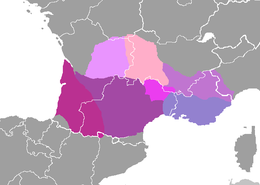Occitan
| Occitan | |
|---|---|
| occitan, lenga d'òc | |
| Native to | France, Spain, Italy, Monaco |
|
Native speakers
|
estimates range from 100,000 to 800,000 (2007–2012) |
|
Early forms
|
Old Occitan
|
| Dialects |
|
| Official status | |
|
Official language in
|
Catalonia (Spain) |
|
Recognised minority
language in |
Italy (Law number 482 of 15 December 1999)
|
| Regulated by | Conselh de la Lenga Occitana; Congrès Permanent de la Lenga Occitana; Institut d'Estudis Aranesi |
| Language codes | |
| ISO 639-1 | oc |
| ISO 639-2 | |
| ISO 639-3 |
Individual code: sdt – (Judeo-Occitan) |
| Glottolog | occi1239 |
| Linguasphere | 51-AAA-g & 51-AAA-f |
 |
|

various dialects of Occitan
|
|
Occitan (English pronunciation: /ˈɒksᵻtən, -tæn, -tɑːn/;Occitan: [utsiˈta];French: [ɔksitɑ̃]), also known as lenga d'òc (Occitan: [ˈleŋɡɔ ˈðɔ(k)]; French: langue d'oc) by its native speakers, is a Romance language. It is spoken in southern France, Italy's Occitan Valleys, Monaco, and Spain's Val d'Aran; collectively, these regions are sometimes referred to unofficially as Occitania. Occitan is also spoken in the linguistic enclave of Guardia Piemontese (Calabria, Italy). However, there is controversy about the unity of the language, as some think that Occitan is a macrolanguage or language family. Others include Catalan in this family, as the distance between this language and some Occitan dialects (such as the Gascon language) is similar to the distance among different Occitan dialects. In fact, Catalan was considered an Occitan dialect until the end of the 19th century.
...
Wikipedia
